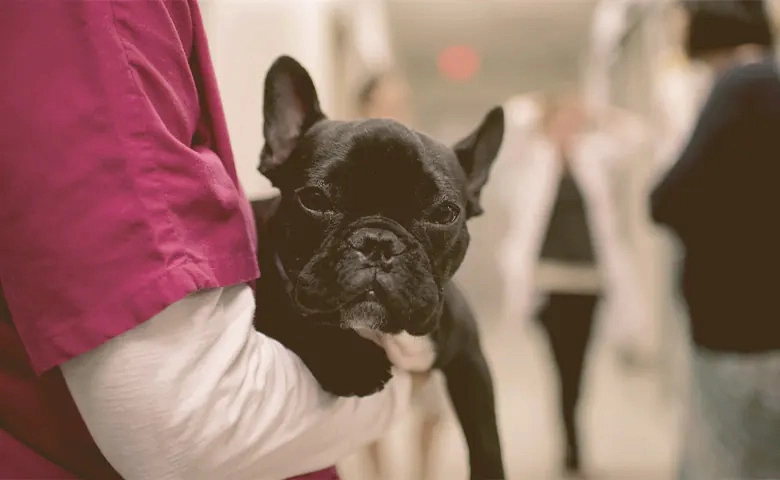6 reasons Why you should neuter your Frenchie ?

THE REASONS WHY YOU SHOULD NEUTER YOUR FRENCHIE

If you have no intention of breeding your French Bulldog, veterinarians highly recommend considering neutering.
This procedure offers numerous advantages that can significantly improve both your pup’s quality of life and your own, regardless of whether your Frenchie is male or female.
Here are six compelling reasons why you should consider neutering your Frenchie:
- Prevent Continuous Discharge: Neutering male French Bulldog puppies prevents ongoing yellow discharge from their genitals, eliminating concerns about staining your furniture.
- Reduce Problematic Behaviors: Neutering significantly decreases behaviors such as humping and territorial marking in male Frenchies.
- Stop Heat Cycles: Neutering female Frenchies halts the twice-yearly heat cycles accompanied by a bloody discharge lasting around 2-3 weeks. This prevents unexpected pregnancies and provides peace of mind about your Frenchie girl’s reproductive health.
- Reduce Instinct-Driven Behaviors: After neutering, their bodies produce fewer sex hormones, reducing instinct-driven behaviors, although firm leadership is essential to address all behavioral issues in your Frenchie.
- Increase Sociability: Neutered Frenchies often exhibit increased friendliness and reduced aggression towards other dogs.
- Lower Health Risks: Neutering decreases the risk of infections, inflammations, tumors, and even cancer, potentially extending your Frenchie’s lifespan.
Keep in mind, these reasons are suggestions to prepare you for potential challenges with your puppy. Ultimately, trust your instincts to decide what’s best for you and your furry companion.
Navigating the Timing and Considerations for Neutering French Bulldogs

Determining the optimal age for neutering your french bulldog can pose a perplexing dilemma.
Neutering, while offering numerous advantages, also carries inherent anesthetic risks and potential adverse effects. It’s essential to discern the ideal timing for this procedure.
Neutering and spaying are highly recommended for rescued dogs, serving as preventive measures against the birth of litters prone to health issues.
Nevertheless, misconceptions abound regarding French bulldog neutering, attributing weight gain, stunted growth, and laziness to the procedure.
In reality, these outcomes hinge on the owner’s responsibility, lifestyle, and care.
The pivotal question remains: when is the best time to neuter a French bulldog? Typically, the procedure is advisable when the dog achieves full muscular development, usually around the 8th to 12th month of age. Opting for an earlier surgery tends to yield better results.
However, it’s crucial to find a reputable hospital and experienced anesthesiologists familiar with the breed to mitigate anesthetic risks.
Addressing these concerns surrounding the timing and considerations for neutering French bulldogs remains a vital aspect of responsible pet ownership.
Factors such as the dog’s development stage and potential health benefits should be carefully weighed in consultation with a trusted veterinarian, ensuring the well-being and longevity of your cherished companion.

Debunking Neutering Misconceptions
You’ve probably heard a few misunderstandings about neutering dogs, and it’s time we shed some light on these notions.
“My Frenchie’s Personality Will Change.”
Some folks worry that their Frenchie’s charm will vanish after neutering, leaving them with a lackluster pooch. But that’s not true! Neutering mainly addresses unwanted behaviors like mounting, spraying, and aggression in male dogs, not their overall personality.
“Dog Mating is a Basic Need.”
Contrary to popular belief, dogs don’t mate for pleasure; it’s their instincts at play. These instincts fade away once they’re neutered, so the need for mating isn’t a fundamental requirement.
“My Frenchie Will Get Fat and Lazy.”
Neutering itself doesn’t make dogs gain weight. It triggers hormonal changes that slow down metabolism and increase appetite.
To maintain a healthy weight, they might need fewer calories or more exercise. Specialized foods for neutered dogs are available, but it’s also crucial to ensure your Frenchie gets enough physical activity.
What the Neutering surgery Involves

The neutering process for French Bulldogs is relatively swift and straightforward. Vets perform a surgical procedure called orchiectomy, involving the removal of the testicles. While surgical, it’s considered minimally invasive.
Here’s an overview of how it typically unfolds:
- The dog is anesthetized to ensure they don’t feel any discomfort during the surgery.
- A small incision is made in front of the scrotal sac, allowing for the removal of both testicles, leaving the sac intact.
- Sometimes, the incision is so small that stitches aren’t necessary. However, the vet may opt to dress or stitch the wound before sending your dog home.
- The entire procedure usually takes no more than 20 minutes, with an additional 30 minutes needed for recovery from anesthesia.
- In most cases, your French Bulldog can return home the same day as the surgery.
After the wound heals, your Frenchie will have a small flap of skin where the testicles once were.
Potential (though rare) Complications
It’s crucial that your vet has experience with French Bulldogs due to their sensitivity to certain types of anesthesia, like sevoflurane, which is safer for breeds with brachycephalic syndrome.
Breathing complications during surgery are rare but possible due to the flat-faced structure resulting from generations of breeding.
Post-Neutering Expectations
Your vet will provide guidance and a post-operative care plan, including:
- Using a cone to prevent your dog from reaching the wound and potentially causing infection.
- Temporary loss of appetite, which should return to normal within a few days.
- The scrotal area will gradually flatten, resembling a flap of skin over time.
- Restricting physical activity for a few days to prevent the wound from reopening.
- Monitoring for signs of infection.

Conclusion:
Deciding whether to neuter your French Bulldog is a big deal. Sometimes, there are ideas that make it confusing. But knowing the truth helps you make the best choice for your furry friend.
Think of it this way: neutering mostly helps fix certain behaviors in boy dogs, without changing their fun personalities.
And, contrary to what some believe, dogs don’t mate because it’s fun; it’s just an instinct that fades away after neutering.
Now, about weight gain worries! Neutering might make your Frenchie a bit slower and hungrier, but with the right food and enough playtime, they can stay healthy.
Making the call to neuter your Frenchie means looking past these misunderstandings. It’s all about keeping your furry pal happy and healthy.
Just remember, being a good pet owner means making smart choices that keep your buddy feeling their best.
You may also like :




